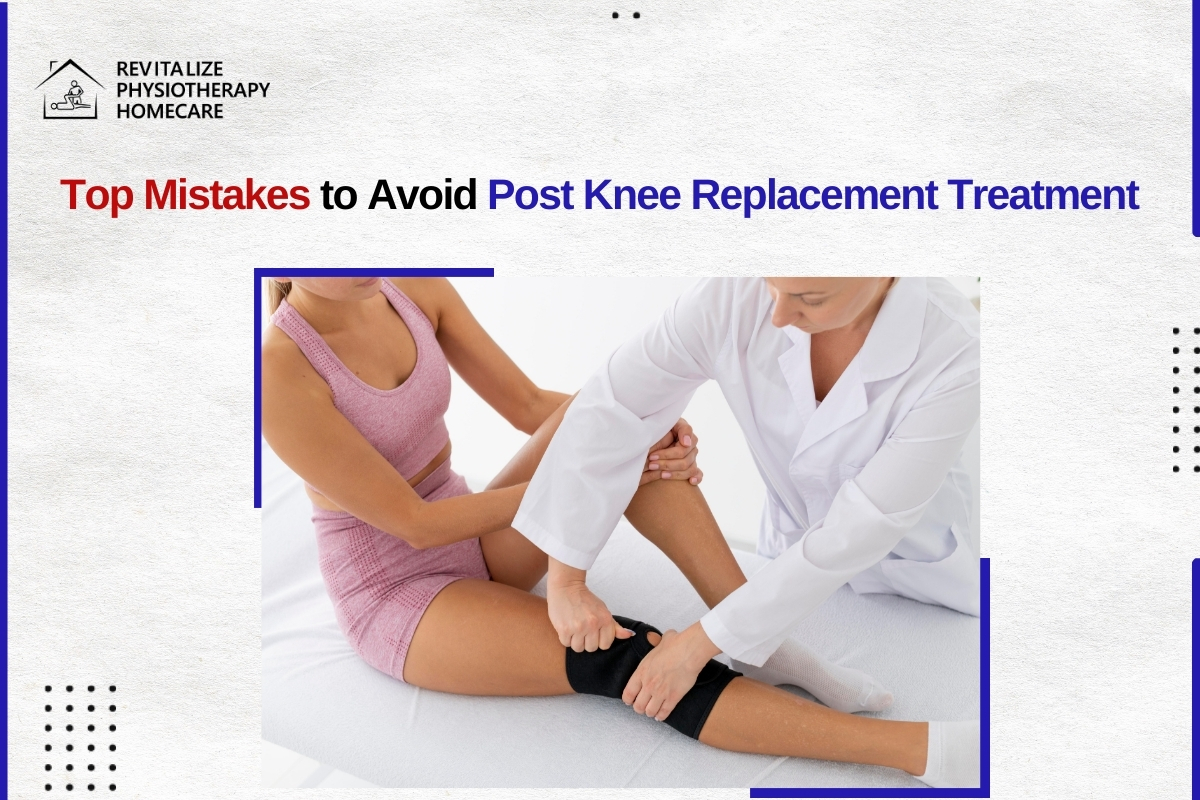Top Mistakes to Avoid Post-Knee Replacement Treatment
Knee replacement surgery is often a life-changing procedure, offering relief from chronic pain and improved mobility. However, how effectively you manage the recuperation period will have a significant impact on the surgery's outcome. While the surgery corrects physical issues, post-treatment care ensures that your new knee functions optimally. Avoiding common mistakes during this critical period is essential to ensure faster recovery and long-term benefits.
Let’s begin by understanding what knee replacement surgery entails.
What is Knee Replacement?
Knee replacement, or total knee arthroplasty, involves replacing a damaged knee joint with a prosthetic one. This procedure is recommended for individuals with severe arthritis, injury, or degenerative joint conditions.
Benefits of knee replacement surgery include:
- Pain relief
- Enhanced joint mobility
- Improved quality of life
While the surgery marks the start of a new chapter, post-surgical care and recovery practices are equally crucial for achieving these benefits.
Now, let’s discuss the importance of post-surgical recovery and where mistakes can derail the process.
Why is Post-Surgical Recovery Important?
Post-surgical recovery focuses on restoring joint function, improving mobility, and preventing complications like stiffness or infections. A structured recovery plan, including physical therapy and lifestyle modifications, helps ensure the best outcomes.
Failing to follow these plans or making common mistakes can delay recovery or even harm the new joint. Let's examine these errors in more detail and learn how to prevent them.
Top Mistakes to Avoid Post-Knee Replacement
1. Skipping Physical Therapy
A key component of knee replacement recovery is physical therapy. Missing sessions can lead to joint stiffness, muscle weakness, and delayed progress. Therapists guide you through exercises tailored to your recovery phase, ensuring that your new knee regains strength and mobility.
How to avoid this mistake:
- Commit to all scheduled therapy sessions.
- Practice the prescribed exercises at home between visits.
Now that we understand the importance of therapy, let’s explore the role of pain management.
2. Poor Pain Management
Ignoring pain or overusing medications can hinder recovery. Pain is a natural part of healing, but effective management is key to staying active and completing your therapy regimen.
Tips for managing pain:
- Use prescribed pain medications responsibly.
- Apply ice packs to reduce swelling.
- If your discomfort continues or gets worse, let your doctor know.
Next, let’s look at why doing too much too soon can harm your progress.
3. Overdoing Physical Activity
Feeling better doesn’t mean your knee is fully healed. Overexerting yourself with strenuous activities can strain the new joint and delay recovery.
How to avoid this mistake:
- Follow your therapist’s guidance on activity levels.
- Gradually increase your movement to build strength safely.
On the other hand, inactivity can also be problematic. Let’s explore this next.
4. Avoiding Movement and Exercises
While overdoing it is harmful, staying too idle can also stall progress. Avoiding prescribed exercises can lead to muscle atrophy, joint stiffness, and slower recovery.
What you can do:
- Incorporate light, low-impact exercises into your daily routine.
- Stay consistent with therapy exercises, even when they feel challenging.
Now that we’ve covered movement, let’s talk about the impact of diet on recovery.
5. Neglecting a Healthy Diet
Your body needs proper nutrition to heal effectively. A poor diet can slow recovery and lead to unnecessary weight gain, putting extra stress on your knee.
Dietary recommendations:
- Include lean proteins for muscle repair.
- Add calcium and vitamin D for strong bones.
- Avoid processed and sugary foods.
Alongside diet, regular follow-ups with your doctor are equally critical. Let’s discuss this next.
6. Skipping Follow-Up Appointments
Follow-up visits allow your doctor to monitor your progress and address any complications early. Skipping these appointments might cause you to miss important adjustments to your recovery plan.
Why follow-ups matter:
- They ensure the prosthetic knee is functioning correctly.
- Early intervention can prevent long-term complications.
Finally, let’s not overlook the mental side of recovery.
7. Neglecting Mental Health
The recovery journey can be physically and emotionally taxing. Frustration, impatience, or anxiety can negatively impact your motivation and progress.
How to maintain mental health:
- Set small, achievable recovery goals.
- Seek support from family, friends, or counselors.
- Celebrate every milestone, no matter how small.
Conclusion
Recovering from Knee Replacement Treatment requires a balance of physical activity, proper care, and mental resilience. Avoiding mistakes like skipping therapy, neglecting diet, overexerting yourself, or ignoring follow-up care can significantly improve your recovery journey.
At Revitalize Physiotherapy and Homecare, we provide expert guidance tailored to your needs, ensuring that you recover safely and effectively. Contact us at 905-452-0222 or email us at info@revitalizephysiocare.com to take the first step toward a smooth recovery today!




